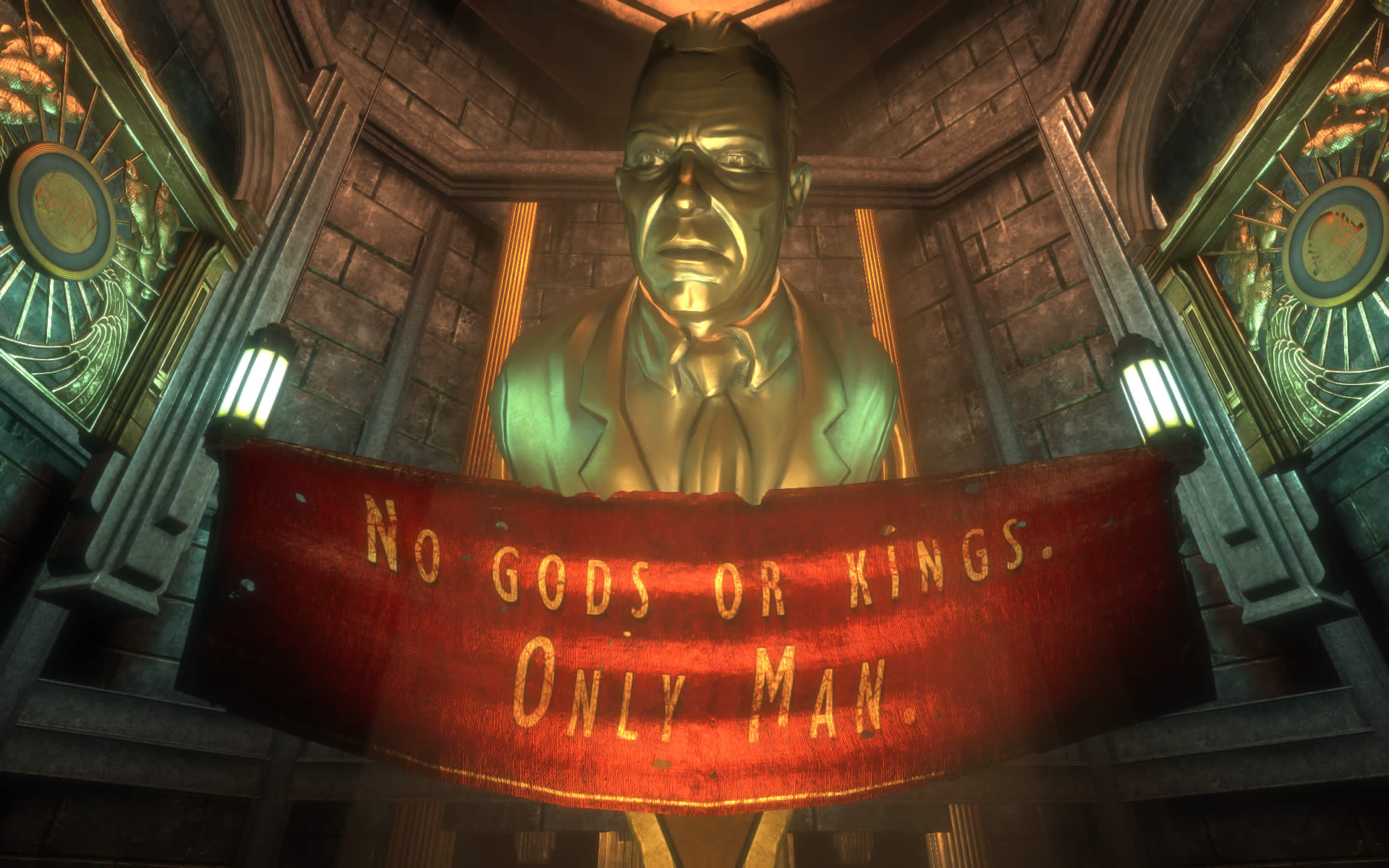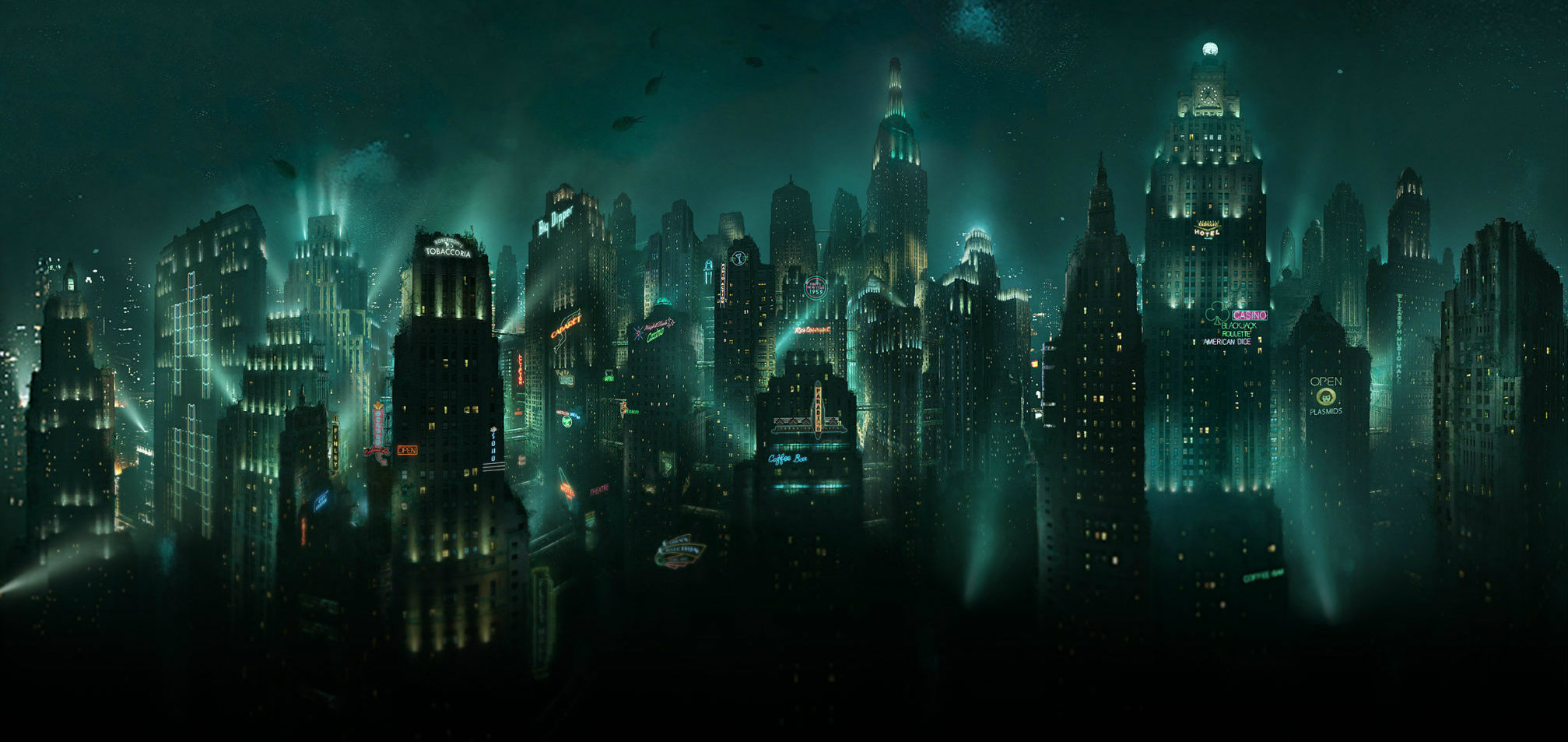It wouldn't be a stretch to say that 2007's BioShock is one of the most acclaimed video games ever created. Look at the top games section at your typical review outlet, and there's a strong chance that BioShock will be near the top of the list (alongside its second sequel BioShock Infinite, not so much the sadly overlooked BioShock 2). Most people I've spoken to who have played it have nothing but glowing praise for this modern classic. In the eyes of most critics and players then, BioShock is an indisputable artistic achievement for video games; a landmark in the medium.

Yet I myself have often struggled to love this game as much as others do. I don't consider it to be an outright bad game, but I was never particularly enamoured with it either. There are a number of reasons for this: the simplified gameplay compared to its System Shock predecessors; a moral choice system that reduces the player's decisions to mere mechanical evaluations; and an ending that deflates any impact the story may have had in an anticlimactic fizzle. These are all common criticisms, but there's one other flaw in BioShock that, for me, adversely affects the gameplay experience and how the player perceives the virtual world around them - looting.
On the surface level, the presence of looting in BioShock makes a great deal of sense - you are, after all, trying to survive in a crumbling underwater city where the crazed former denizens will be waiting around every corner to get the drop on you. So it seems reasonable that you'd want to make exploration a central activity for the player; to scavenge for every resource you can find. For me though, BioShock's approach to exploration and looting is actually a detriment to its story and setting. Because the general gameplay has the player focusing on gathering resources, they also tend to stop paying close attention to the world itself. As far as the player is concerned, subconsciously or not, the world is just one giant loot crate.
 |
| That's pretty gruesome...better loot him for ammo and not think twice about it, the game certainly won't |
Think of this another way - when the player comes to a room which is strewn with dead bodies, then the story will obviously be expecting the player to be disturbed by the sight, as one should be. Indeed, the BioShock games frequently make use of bloody images that, taken on their own, would look shocking to the casual observer. But the gameplay portion of BioShock contradicts this expected shock value, because the player will be encouraged to instead loot every body they can find for health kits and scraps of ammo before continuing on their way. This certainly isn't helped by the fact that BioShock seldom quietens down long enough for the player to absorb the world around them - the action is so frequent and 'shouty' that the player isn't really given time to appreciate the atmosphere or ambiance of the setting.
This extends into every part of the environment - the gameplay doesn't encourage you to take in your surroundings or think about the sights you're seeing, instead you're merely encouraged to mash the use key at every container-like object in the room before following the floating arrow to your next objective. There is a brilliantly realised world in BioShock - a steampunk underwater city full of dark intrigue and art deco idealism gone terribly wrong. There's also a pretty good story here, which has already been analysed frequently in other columns, so I won't repeat any of the major beats here. Yet it all seems to be in service of a game where your primary objective is to kill, loot and repeat, with occasion button-prompted moral choices that are about as nuanced as the colours on a chess board.
I'm certainly not arguing that BioShock is bad; the gameplay itself still makes for a fun experience and offers enough flexibility to make each playthrough an interesting one. At the same time, I can't help but shake the feeling that the gameplay is also responsible for diminishing both the story and the setting. The term "ludo-narrative dissonance" is often used to describe a conflict in game design where the actions of the player during gameplay don't line up with the character's actions within the context of the story1. Although not a term I typically use, it could easily apply to BioShock in this respect - the story expects you to think and feel horror at the cruel depths of extreme human idealism you're witnessing; but the gameplay just expects you to shoot, loot and keep moving. This becomes even more painfully obvious in BioShock Infinite, where the gameplay is further watered down in favour of becoming a stock shooter in service of an even more pretentious hole-ridden story. The dissonance is even more noticeable here, as there's little context in Infinite's narrative that can explain any of the core gameplay mechanics or why they exist. It's part of the reason BioShock Infinite is so gratuitously, pointlessly violent.
This isn't a problem limited to BioShock, but I would still argue that this kind of fast-paced kleptomaniac approach to exploration is often counter-intuitive from a storytelling perspective. Slower-paced games such as Thief or Deus Ex solve this problem be requiring the player to carefully analyse their surroundings to find key items, going beyond merely exploring nooks-and-crannies towards players building a detailed mind-map of their surroundings. Indeed, the levels in the older Thief games could be viewed as being giant self-contained puzzle boxes that required the player to see them primarily as being authentic believable locations that fit together under internal logic rather than merely as a linear succession of challenges to be overcome. The levels in these 'immersive sim' games are designed first and foremost to feel like believable worlds built around player expression; the levels in BioShock mostly just feel player-orientated (or, for want of a better word, 'video-gamey'), robbed of its own internal logic2.
For me, this 'loot-crate' mentality is a major challenge to game designers - how can they encourage players to explore their environment without reducing the game itself to an elaborate collect-a-thon? Open-world games such as Far Cry or Assassin's Creed increasingly suffer from this looting obsession as well, where the focus is less on how the player can express themselves within a virtual world and more about giving people an overstuffed list of menial tasks to complete. With the exception of many 'im sim' games and some survival horror games, I don't feel any developer has completely cracked this problem. On the other hand, the recent resurgence of immersive simulators (as discussed by Games Workshop in this excellent video) gives me hope that developers will continue to explore the manner in which players see the virtual space around them. Perhaps soon, we'll be able to look past the next loot box and instead see the world beyond.

References:
1 The term was actually coined in relation to BioShock by Clint Hocking, you can read the original piece here: http://clicknothing.typepad.com/click_nothing/2007/10/ludonarrative-d.html
2 For one thing, why do the revival chambers in this game only affect the player? At least in System Shock 2, the player needed to actually find them first.
No comments:
Post a Comment